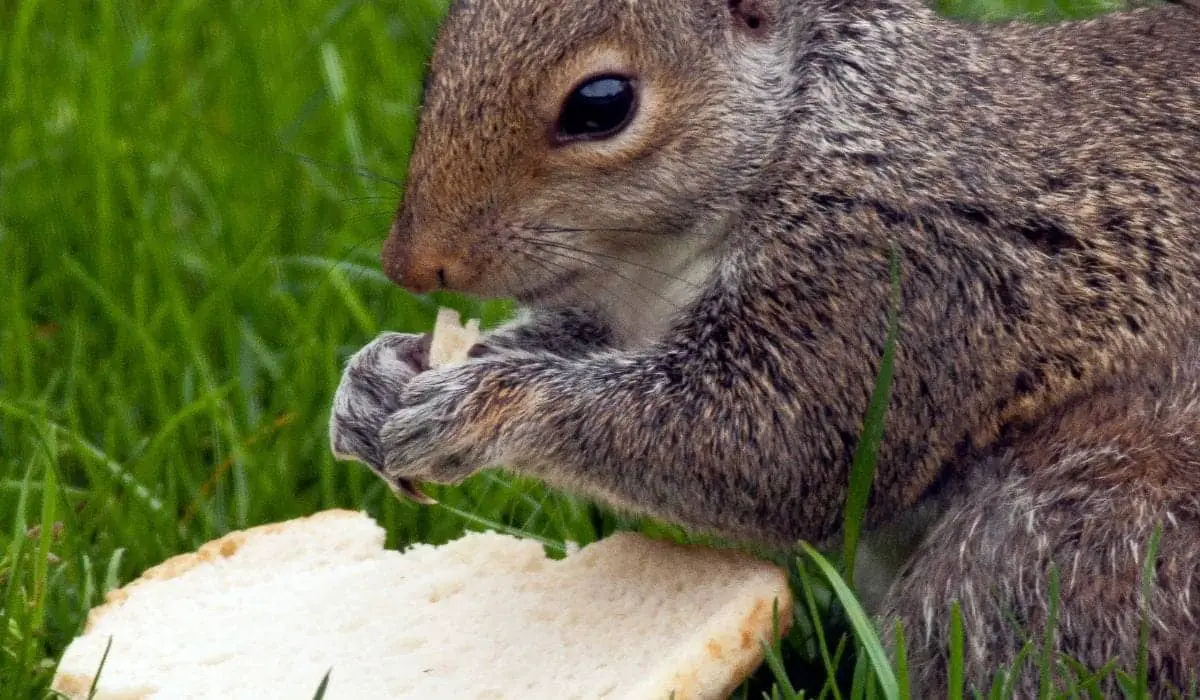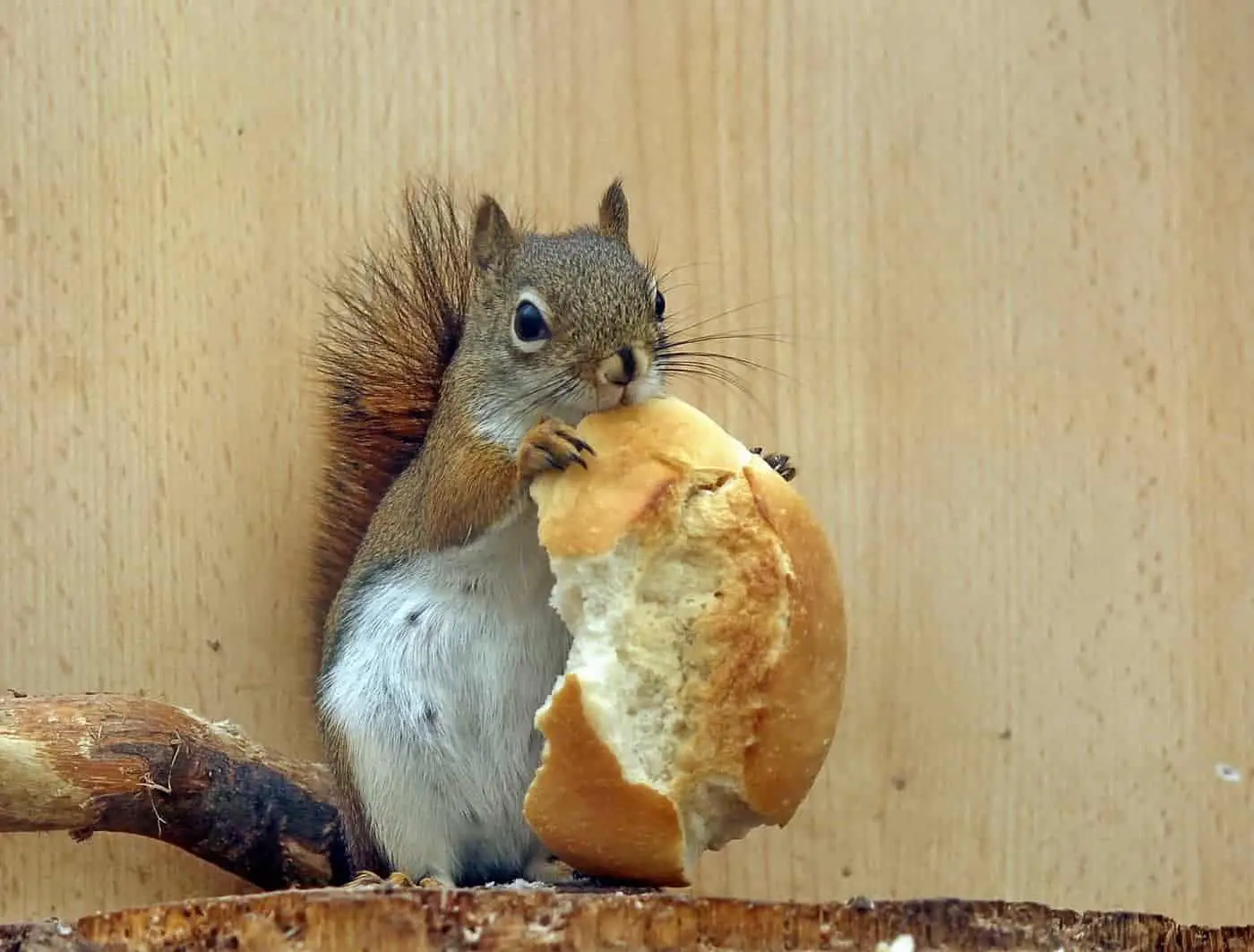Squirrels And Bread: Should You Feed It To Them? Find Out!
Ever watched a squirrel scamper across your yard, a tiny bandit with an insatiable appetite? The image of a squirrel happily munching on a piece of bread might seem charming, but the truth is far more complex and potentially detrimental to these creatures' health. Is offering a crust of bread really a harmless act of kindness, or are we inadvertently contributing to their malnutrition?
Squirrels, with their bushy tails and endearing antics, have become a familiar sight in parks, gardens, and even bustling cityscapes. Their adaptability has allowed them to thrive in various environments, and their omnivorous nature means they aren't particularly picky eaters. While their natural diet primarily consists of nuts, seeds, fruits, and vegetables, they are opportunistic feeders, readily accepting whatever food source is available. This adaptability, however, can be a double-edged sword, especially when it comes to human-provided foods like bread.
| Category | Information |
|---|---|
| Species: | Eastern Gray Squirrel (Sciurus carolinensis) - Most common in North America and often the species people are referring to. Other species exist with varying dietary nuances. |
| Dietary Classification: | Omnivore |
| Natural Diet: | Nuts (acorns, hickory nuts, walnuts), seeds, fruits (berries, apples), vegetables, fungi, insects, bird eggs (occasionally), and even small vertebrates when the opportunity arises. |
| Foods to Avoid Feeding: | Bread (especially white bread), processed foods high in sugar and salt, corn, sunflower seeds, peanuts (due to aflatoxin concerns and poor nutritional value as a primary food source), candy, chocolate. |
| Healthy Alternatives to Bread: | A variety of nuts and seeds (in moderation walnuts, pecans, hazelnuts are better than peanuts), fresh fruits and vegetables (berries, apple slices, carrot sticks, broccoli), commercially available squirrel food. |
| Nutritional Concerns with Bread: | Low nutritional value, high in carbohydrates and sugars, lacks essential proteins, fats, vitamins, and minerals, can lead to malnutrition and health problems. The cellulose is difficult for them to digest. |
| Risks of Feeding Bread Regularly: | Malnutrition, obesity, dental problems, metabolic bone disease (especially in young squirrels), reliance on human-provided food leading to decreased foraging skills, habituation to humans and potential for aggressive behavior. |
| Safe Bread Options (in tiny quantities as a rare treat): | Whole grain bread (in very small amounts, no more than 10 grams a day), sprouted grain bread. Even these options are not ideal and should be offered sparingly. |
| Why Squirrels Eat Bread Despite Being Unhealthy: | Opportunistic feeding behavior, readily available, easy to consume, palatable due to sugar and salt content. Lack of understanding of long-term health consequences. |
| Reference Website: | National Wildlife Federation - Eastern Gray Squirrel |
One of the primary concerns surrounding bread consumption in squirrels is its lack of nutritional value. Bread, particularly white bread, is largely composed of carbohydrates and sugars, offering little in the way of essential proteins, healthy fats, vitamins, and minerals. These nutrients are crucial for squirrels to maintain their health, build strong bones, and support proper organ function. When squirrels fill up on bread, they are essentially displacing more nutritious food sources from their diet, leading to malnutrition over time.
- Kat Movie Hd Com Your Ultimate Guide To Streaming And Downloading Movies
- Aubreigh Wyatt Messages The Ultimate Guide To Understanding And Decoding
This malnutrition can manifest in various ways. Young squirrels, whose bodies are still developing, are particularly vulnerable. A diet deficient in essential nutrients can result in poor bone development, increasing the risk of fractures and deformities. Organ damage and stunted growth are also potential consequences. Adult squirrels, while more resilient, are not immune to the negative effects. They may experience weight gain, leading to obesity and related health problems, such as diabetes. Furthermore, a reliance on bread can diminish their natural foraging skills, making them overly dependent on humans for sustenance.
The high sugar content in many types of bread also poses a threat to squirrel health. Just as excessive sugar consumption can lead to dental problems and weight gain in humans, it can have similar effects on squirrels. The simple sugars in bread can contribute to tooth decay and obesity, increasing their susceptibility to other health issues. Some bread items even contain more sugar than candy, making them a particularly poor choice for these animals.
Another factor to consider is the presence of cellulose in bread. Cellulose is a complex carbohydrate that is difficult for squirrels to digest. While they can physically consume bread, their digestive systems are not well-equipped to break down cellulose efficiently. This can lead to digestive issues, such as bloating, constipation, and discomfort. Over time, these digestive problems can further compromise their health and well-being.
- New Movie Rulz The Ultimate Guide To The Hottest Film Trend In 2023
- Why Filmy4wap Xyz South Movie 2022 Is The Ultimate Destination For Film Enthusiasts
The opportunistic nature of squirrels is often what leads them to consume bread in the first place. They are known to approach humans in parks and gardens, often begging for food. Their intelligence allows them to learn quickly that humans are a reliable source of sustenance, and they may readily accept whatever is offered, even if it's not the most nutritious option. This behavior is further reinforced by the ease with which they can obtain bread. It's often readily available in parks, gardens, and even residential areas, making it an easily accessible food source.
So, if bread is so detrimental to squirrel health, why do they eat it? The answer lies in a combination of factors. First, bread is palatable. The high sugar and salt content makes it appealing to their taste buds. Second, it's easy to consume. Unlike nuts and seeds, which require some effort to crack open and process, bread is soft and readily digestible (even if it's not digested efficiently). Finally, squirrels lack the understanding of long-term health consequences. They are driven by immediate gratification, seeking out the easiest and most readily available food source, regardless of its nutritional value.
It's also important to note that human food, in general, can alter the natural eating habits of squirrels. Instead of relying on their natural diet of nuts, seeds, fruits, and vegetables, they may become increasingly reliant on human-provided foods, leading to a decline in their foraging skills and a shift in their dietary preferences. This can disrupt the delicate balance of their ecosystem and have unintended consequences for their overall health and survival.
While squirrels can physically eat hard bread, the nutritional concerns remain the same. It still lacks essential nutrients and can fill them up without providing necessary sustenance. Moderation is key, but its better to choose more nutritious options. Never feed squirrels moldy bread, as mold can be toxic to wildlife!
Given the numerous health risks associated with feeding squirrels bread, it's essential to explore alternative food sources that are more beneficial to their well-being. Fortunately, there are many nutritious options that can provide squirrels with the essential nutrients they need to thrive. These include:
- Nuts: Walnuts, pecans, hazelnuts, and almonds are all excellent sources of protein, healthy fats, and vitamins. However, peanuts should be avoided due to concerns about aflatoxin contamination and their poor nutritional value as a primary food source.
- Seeds: Pumpkin seeds, sunflower seeds (in limited quantities due to their high fat content), and flax seeds are all good sources of essential fatty acids and minerals.
- Fruits: Berries, apples, grapes, and melon are all healthy and delicious options.
- Vegetables: Carrots, broccoli, spinach, and sweet potatoes provide essential vitamins and minerals.
- Commercially available squirrel food: These foods are specifically formulated to meet the nutritional needs of squirrels and can be a convenient and reliable source of sustenance.
When offering food to squirrels, it's important to do so in moderation. Overfeeding can lead to weight gain and a reliance on human-provided food. A small handful of nuts or seeds per day is generally sufficient. It's also important to avoid leaving food out in large quantities, as this can attract other animals, such as rodents and birds, and create unsanitary conditions.
If you choose to offer bread, stick to whole grain bread in small portionsno more than 10 grams a day. It should only be a tiny part of their diet. Tear the bread into small bites; smaller pieces are easier for squirrels to eat and can reduce the risk of choking. Even these options are not ideal and should be offered sparingly.
In the winter, when food is scarce, squirrels might be more tempted to eat bread. However, its still not a healthy choice for them. While squirrels can eat bread in moderation, it's not the best option. Yes, squirrels are opportunistic eaters and will consume bread if available; however, it's crucial to offer a varied diet. Feeding squirrels bread daily is like eating fast food all the time. So eating a small cracker or a piece of bread is a small feat for them; however, just because they can eat anything, doesnt mean they should eat everything.
Offering too much bread in your feeders leads to unhealthy birds with vitamin deficiencies. The truth is that feeding birds bread wont harm them. Yet, bread offers no nutritional value to birds at all. The risk is that birds can easily fill up on bread and then not go on to eat food with the nutrients they need.
Ultimately, the decision of whether or not to feed squirrels bread is a personal one. However, by understanding the nutritional implications and potential health risks, you can make an informed choice that prioritizes the well-being of these fascinating creatures. While a small piece of bread may seem like a harmless treat, it's important to remember that their long-term health and survival depend on a balanced and nutritious diet. By offering them healthy alternatives and avoiding the temptation to feed them bread, you can contribute to their well-being and ensure that they continue to thrive in our communities.
- Www Movierulz Vpn Your Ultimate Guide To Streaming Movies Safely
- Get Ready For Thrills With Ibomma Telugu Latest Movies

Can Squirrels Really Eat Bread or Toast? Do They? (Solved) Into Yard

Can Squirrels Really Eat Bread or Toast? Do They? (Solved) Into Yard

Can Squirrels Eat Bread? A Comprehensive Guide